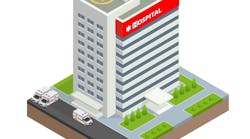The past five years have seen a major evolution within the healthcare physical security space. Dramatically changing how healthcare security professionals conduct business today and in the future. The first evolution is the advances in security system technology. Security systems advanced technology can now truly integrate disparate systems making for easier use and greater data gathering and analysis. The second is the insertion of AI into physical security systems. AI is revolutionizing the physical security space by changing what we can see, how we see it and the prediction of adverse events. Third, is the revitalization in the use of physical security systems within the healthcare industry. Covid highlighted the importance of physical security systems within the healthcare setting and the continued examination of technology to help resolve current issues residing within the healthcare industry.
Advancements in Security Technology
Security technology systems have advanced, providing tools that help the healthcare security director better protect patients, visitors, and staff. Advanced technology systems can now detect and identify specific types of sounds. For example, raised voices. The escalation of an argument or fight. Alerting security of a potential event in the Emergency Department, the ICU waiting area or anywhere a video camera is present. Systems can determine gunshots. Specialized systems can detect the discharge of a gun and ever distinguish the types of guns being discharged.
Integrated technology can pinpoint locations and track people who have discharged a gun. Electronic security systems can now integrate with other disparate systems. Combining access control, with video management, visitor management, infant protection, computer-aided dispatch systems (CAD), or incident management systems, to name a few. Better tracking inventory for keys, cards, security and hospital equipment, vehicles and cameras, card readers and all other physical security devices.
AI has become a major component of physical security technology and has transformed the healthcare security industry in several distinct ways. Al has expanded the ability of video surveillance through the improvement of object recognition. Systems now can detect specific objects like weapons and alert security of the event as well as track persons throughout the healthcare facility. Whether it’s patient elopement or an infant abduction, AI has expanded the ability to track persons and things. Now detailed descriptions or photos can be loaded into the video management software and the software can search all cameras to find the person in question.
This can be done not only in recorded video but in real-time, live video. Al can find and track specific vehicles based on license plate number, make and model of the vehicle or vehicle color. Video systems can determine people who are loitering, like individuals who are hanging around building entry doors or the entrance to the Emergency Department or Maternity units. As stated earlier, distinguish sounds to determine raised voices, gunshots, screams for help and even keywords. Through data analysis, Al can assist in predicting outcomes and analyzing efficiencies, helping to reduce the potential for adverse events and improving productivity.
COVID-19 and its Effects on Security Technology
COVID-19 exposed the need for security advanced technology within the healthcare setting. Many hospitals and other healthcare institutions relied on security technology to help in the Covid-19 battle. Primarily, hospitals, clinics and other off-site facilities relied on temperature screening and tracking systems to help monitor staff and visitor compliance. Visitor management systems were implemented to better screen and track visitors during Covid. CCTV cameras were added along with other security devices to restrict access to facilities so that all persons could be funneled into key temperature screening locations. CCTV and other security devices were also used to monitor entrances and exits to augment workforce shortages.
This reliance on security technology sparked new interest in its ability to not only provide institutional security but to enhance healthcare operations, solving some of healthcare’s biggest problems. Supplementing workforce, simplifying operations, and providing real-time data for Covid compliance. Today, healthcare institutions are looking for advanced technology to assist in the reduction of violence, track persons and provide access control so that staff, patients, and visitors feel safer.
Advanced Security Technology’s Greatest Gift
The greatest gift that advanced security technology has given healthcare security is data analytics. It is the collection and manipulation of data that is the most impactful to healthcare security professionals. Today’s advanced security systems along with AI can gather data from disparate systems, combine databases and manipulate the data to provide, never seen before, information that can help healthcare security directors work more efficiently, respond to incidents faster and better predict risks and threats to the healthcare institution. Having the ability to collect and merge data on visitor management systems, metal detector alarms, false alarms within burglar and infant protection systems, security system outages, unauthorized use of access control devices and monitoring of security systems to determine patterns and trends within the data set.
Better defining the highs and lows in patterns and trends within data and determining the exceptions within a normal or average data set. Providing exception reporting by identifying spikes in incident, video, and access control data. For example, identifying people who repeatedly appear in incident reports, within the visitor management system, violate access control protocols or continually loiter within high-risk areas.
The Future of Advanced Security Technology
How do these advancements help solve some of the pressing challenges facing healthcare security today and in the future? Advanced security technology will improve security department efficiencies. Determining efficiencies in security services and incidents through defined analytics. AI will continue to evolve providing better predictive modeling to determine the most vulnerable places and staff within the healthcare institution. It will help in determining directed patrol and post assignments within identified high-risk locations. Advanced security technology will be able to analyze security department financial and workforce data to continually recognize operational efficiencies. New security technology will assist clinical, operational, and security staff in the prediction and warning of potentially aggressive behaviors. Identify, track, and alert security and hospital staff to high-risk people. Patients attempting to leave or who are kidnapped, and identifying unauthorized persons who enter or loiter around hospital property. People who are barred from the healthcare institution due to employment termination, visitor restrictions, or previous violent acts.
Advanced security technology is the path forward for healthcare security. The advantages it provides today and, in the future, dramatically increase the potential to reduce violence and increase operational efficiencies. However, the key to the effective use of advanced security technology is understanding how it works and what advantages it has for the healthcare organization.
The Healthcare Security Director’s Role in Advanced Security Technology
Advancements in technology have brought an onslaught of new technology and AI-branded products into the healthcare security marketplace. Each has its own unique features and pricing structures. There are now many product options for healthcare security professionals to choose from, making the security technology market a very confusing place. Ensuring that the right products are purchased and work effectively for the organization is key to the successful application of the newest technology.
The issue with using advanced technology is not so much that the product truly works but the security director’s understanding of the product and how it will resolve security-related problems within the healthcare organization. Security technology is advancing rapidly. Products continue to get better; AI is becoming more predictive and technology manufacturers are focusing more on providing solutions to help the healthcare industry.
For the healthcare security professional, the future is very bright. With the continued advances in security technology healthcare security directors will have greater ability to provide effective security services.
How to Make Technologies Work for You
So how can today’s healthcare security directors best utilize and plan for the newest advanced security systems? To successfully utilize advanced security technology, security directors need to educate themselves on how these technologies work and determine how technology best fits within the healthcare organization. How advanced technology can solve the specific security and organizational problems present within the healthcare organization? As difficult and confusing as it can be, learning about the different available technologies, how they work, and where each company is going in the future is paramount to selecting and using advanced technology security systems.
Often, because of the lack of education, many healthcare security directors rely on integrators to choose the technology and products their institution uses for security systems. With the rapid advancements in technology and the constant growth and development of these products, many integrators may not understand a specific product or its full potential in resolving a healthcare institution’s security problems. It is imperative that as professionals, healthcare security directors focus on educating themselves on the newest advanced technology products. Speaking directly with manufacturers or product representatives is one way to obtain information on a particular product or system.
Working with an integrator who understands technology and can offer a variety of product solutions within their portfolio is another. Additionally, healthcare security directors need to work with leading publications and conference administrators to provide more technology education that is not based on profit, quota, or commission, but based on educating the end user.
Because of the complicated nature of advanced security technology and understanding what products work best for your institution, another option for the healthcare security professional is to hire a security technology consultant. An individual or group of people who understand multiple products and work closely with manufacturers to understand how they work and what the best application for their products might be. This is especially true when a healthcare institution is making a major change in its security systems. For example, changing out an old access control system throughout the entire organization, looking to integrate video management into an existing access control system, or when designing a security system for new construction or a major renovation.
In planning for this change, it is important to leave money in the budget to hire a qualified consultant. The consultant will work with the security director to determine what products work best for the healthcare institution and the security department. The consultant will be able to lay out a plan of action for the installation of the systems along with budgetary requirements. This is especially important when a healthcare organization has limited financial resources.
For example, upgrading or purchasing a new access control system or video management system can cost up to a million dollars depending on the size and complexity of the installation. Laying out a plan that can install the new system over several years can help to manage costs, allowing the security department to obtain the new security technology they desire. However, this process must be accomplished correctly for the new or upgraded system to be installed and operate properly.
A consultant can also provide a master or strategic plan which can outline a physical security and financial plan over two to ten years. Many security technology consultants can also provide design services creating as-builts and architectural drawings. These attributes can help the healthcare security director obtain the systems they need to resolve some of the security problems existing within the healthcare organization.
Conclusion
The evolution of advanced security technology is on. Providing a bright future for the healthcare security director. The success in using the new technology resides in the healthcare security director’s ability to understand the technology and how it best fits within the healthcare institution. Continually keeping abreast of the newest innovations and influencing publishers and conference administrators to provide education on advanced security technology is key to successfully implementing and utilizing the newest security technology. Picking the technology that best suits the healthcare institution and can help to resolve some of the pressing problems that are plaguing today’s healthcare organizations. Ensuring that transformation to the newest technology is well thought out and planned from a financial and operational perspective.



